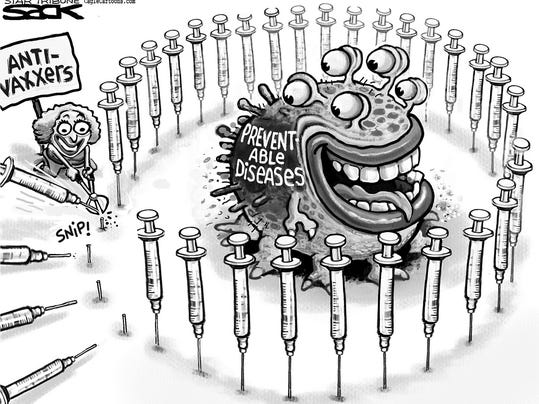The "measlesland" (rashiest place on earth?) fiasco has
left a lot of concerned Americans wondering how we can fix all of this
anti-vaccine nonsense. Hopefully there’s a better solution than waiting for all
of them to die from measles, cervical cancer (HPV), whooping cough, and the
like. It’s bad enough when misguided celebrities stoke the fires of fear and
misinformation, but when politicians start offering more and more vaccine
loopholes as part of their promises you know that something is seriously wrong. Maybe it's best of the pro-science congresspeople (they exist, right?) close these loopholes (because as we've talked about there are medical reasons for certain people not to get one or vaccines) before it's too late.
But what
are we to do? Andrew Wakefield became a martyr after The Lancet retracted his paper in 2011, and the more we criticize
these people, the more dogged they get. It’s easy to forget that measles alone
killed 145,000 children around the world in 2014. As we’ve talked about in
class, even if measles doesn’t kill you, it can leave you with permanent
neurological damage. Vaccine-related deaths are extremely rare in comparison.
The CDC believes that most (if not all) of the deaths associated with certain
vaccines don’t follow a consistent enough story for them to implicate the
vaccines.
People who fight to combat
anti-vaccine sentiment have observed that it’s easier to scare people than it
is to un-scare them. Studies and fact-checking don’t seem to convince these
people. Even when a new study comes out that suggests that “no we really can’t
find a link between vaccines and autism” or “your baby isn’t getting too many
vaccines at once,” people find something else. Maybe something that looks like
a scary toxin (which some pseudoscientific organization like “National Vaccine
Information Center” probably made up). What does?
Well giving them
more data from studies probably feels like you’re just shoving more information
and calling them stupid. It may actually backfire according to one Stanford study
(http://pediatrics.aappublications.org/content/early/2014/02/25/peds.2013-2365).
One of the best
things that a pediatrician can do is to talk to parents like they’re
responsible adults, especially if they’re “on the fence” or “heard something
about vaccines and autism” (like the father from the Penn and Teller video we
saw). In the US at least, this seems to be as much of a frontier as developing
new vaccines. Right now, anti-vaxxers aren’t causing a lot of death in
comparison to causes like homicide and car accidents, but we have to do
something before that changes.
--Joe Getsy

No comments:
Post a Comment